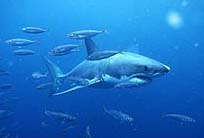|
Rachel Robbins, Shark Researcher
11. How does your research affect the sharks- positive and negative aspects?
There are no negative aspects to the research I undertake since it is mostly observational, I do not interfere with the sharks in any way. However, it is sometimes sad to see the sharks banging into the cages as they an become scraped and sometimes get scared away from contact with the vessel.
In a positive way though, my research is helping to unravel aspects of the sharks’ life history that we previously had no idea about. My satellite tags have shown that they travel huge distances over a relatively short amount of time, and have given us an indication of migratory routes and range. This all helps us better understand them in order to allow management programs to be better implemented. This then allows the protection of the species to be much more effective. |

Great white shark
Image © Ken Hoppen Photography |
12. What is the greatest distance any of your sharks travelled?
A 3m female called “Ticka” traveled over 3000km from Dangerous Reef to north-western Western Australia.
13. What is the fastest shark you have tracked?
Whilst the tag did not actually document swimming speed, the whole journey was completed in 61 days, giving an average of almost 50km swum per day (or an average of 2km per hour).
14. Do sharks ever stop moving?
White sharks do not since they rely on ram ventilation to pass water, hence oxygen, over their gills. Some shark species however are able to lie on the bottom or stay still for prolonged periods since they are able to actively pump water over their gills.
15. Do sharks really smell blood in the water? How do they find their food?
Sharks have a highly developed sense of smell – in white sharks, it is one of the most developed senses they possess. White sharks are able to detect very small concentrations of blood in the water and follow that blood trail to the source. White sharks use all of the sense in order to detect prey, but especially their sense of smell and then their eyesight to stalk seals and sea lions.
16. What temperature ranges do your sharks live in?
White sharks are mainly temperate water sharks, but have been found in waters ranging from 4-27°C although they seem to prefer waters with a temperature range of 15-22°C
17. Why do they cross into different temperature zones?
Possibly in search of prey, or because they are following instinctive migratory routes. It is though that when white sharks penetrate into the tropical zones or into different temperature zones, they are actually staying in deeper waters where those temperatures are much cooler than at the surface and hence they may not be experiencing such fluctuations in body temperature.
18. Do they migrate like whales?
It certainly seems from the satellite tracking that has been conducted around the world that, at least some white sharks are highly migratory. They have been known to swim great distances of over 10,000km in a relatively short period of time. However, some also seem to be semi-resident at the Neptune Islands and in other areas of the world, returning to the same spot for a few months of every year.
19. Do sharks sleep?
Since white sharks have to continually swim in order to pump water over their gills, they cannot stop and swim in the conventional sense. It is thought that they possibly move out into deeper waters away from islands during the night and shut down most of their systems, leaving their lateral line system working. They use the lateral line to keep them a certain distance from the ocean’s surface and can then keep swimming in order to breathe.
20. What can we learn from studying sharks?
There is so much that we do not know about white sharks and their life style that can only be determined from further study. We do not know where they mate or give birth, their migratory routes – and with everything we find out, it opens up another 10 questions!! The more we can find out about sharks, the better we can protect and conserve their populations.
|
